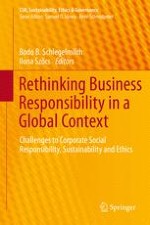2020 | OriginalPaper | Chapter
CSR in India: Evolution, Models, and Impact
Authors : Suresh Mony, Shekar Babu
Published in: Rethinking Business Responsibility in a Global Context
Publisher: Springer International Publishing
Activate our intelligent search to find suitable subject content or patents.
Select sections of text to find matching patents with Artificial Intelligence. powered by
Select sections of text to find additional relevant content using AI-assisted search. powered by
